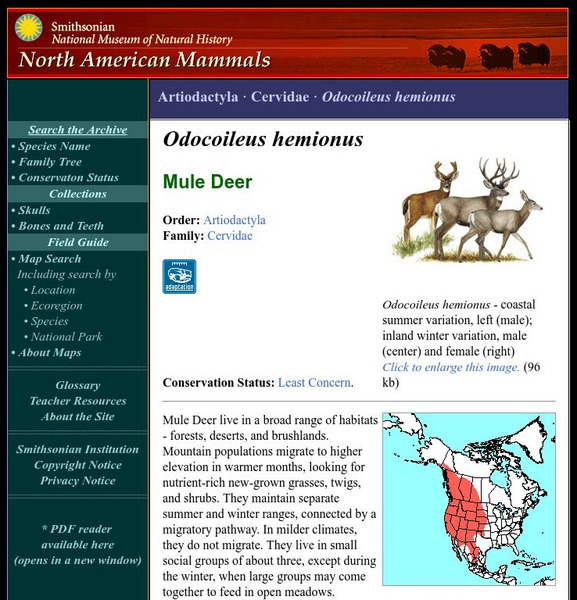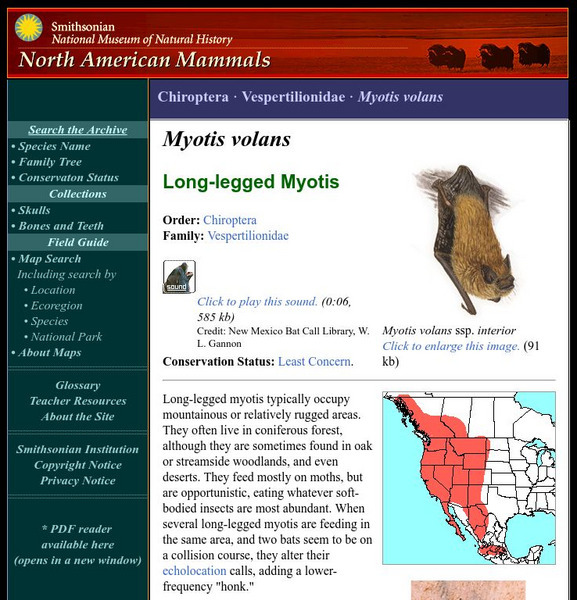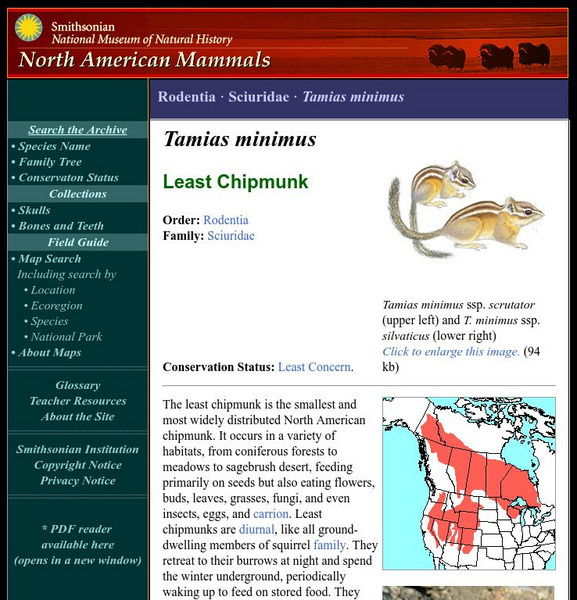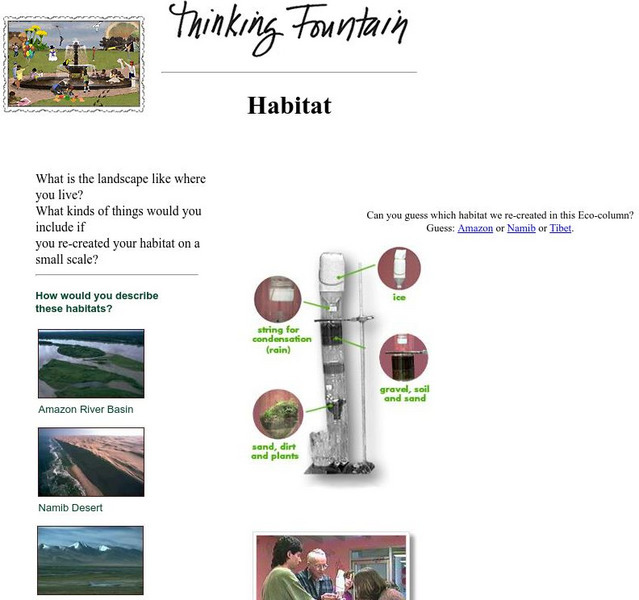Smithsonian Institution
National Museum of Natural History: American Mammals: Mule Deer
Mule Deer live in a broad range of habitats - forests, deserts, and brushlands. Mountain populations migrate to higher elevation in warmer months, looking for nutrient-rich new-grown grasses, twigs, and shrubs. Learn more about the...
Smithsonian Institution
National Museum of Natural History: American Mammals: Long Legged Myotis
Long-legged myotis typically occupy mountainous or relatively rugged areas. They often live in coniferous forests, although they are sometimes found in oak or streamside woodlands, and even deserts. Learn more about the Myotis volans,...
Smithsonian Institution
National Museum of Natural History: American Mammals: Least Chipmunk
The least chipmunk is the smallest and most widely distributed North American chipmunk. It occurs in a variety of habitats, from coniferous forests to meadows to sagebrush desert, feeding primarily on seeds but also eating flowers, buds,...
Science Museum of Minnesota
Science Museum of Minnesota: Thinking Fountain: Habitat
Explore the basics of a few habitats and then create an ecocolumn--a simulated cross-section of a biome such as a rain forest--with your own environment.
Ducksters
Ducksters: Science for Kids: World Biomes and Ecosystems
Kids learn about the world's biomes and ecosystems. The network of life and biodiversity needed for all to survive.
Utah Education Network
Uen: Utah's Plants and Animals Do You Know Where I Live?
Can you figure out what types of biomes different organisms belong in? You'll be presented with a variety of organisms and asked which of three biomes they belong in.
ClassFlow
Class Flow: Plant and Animal Habitats
[Free Registration/Login Required] This lesson explains plant and animal habitats with brilliant pictures and photos. It also includes discussion and non-Activote questions.
Curated OER
Etc: Maps Etc: Vegetation of North America, 1916
A map from 1916 of North America, Central America, Greenland, and the Caribbean to Puerto Rico showing the general distribution of vegetation types in the region. The map is color-coded to show natural vegetation in areas of ice desert,...
Curated OER
Etc: Maps Etc: United States and Neighboring Lands, 1920
A map from 1920 of southern Canada, the United States, and northern Mexico showing terrain features, lakes and river systems, and general vegetation types of the region. The map is keyed to show the submerged portion of the continental...
Curated OER
Educational Technology Clearinghouse: Maps Etc: Land Regions of Asia, 1920
A color-relief map from 1920 of Asia showing the principal landform and vegetation features, river systems, and water features of the region. The map is keyed to show areas of waters less than 500 feet deep, floating ice, lands below sea...
Curated OER
Educational Technology Clearinghouse: Maps Etc: Vegetation Map of Europe, 1916
A map of Europe showing areas of different types of natural vegetation including tundra and alpine flora, coniferous forests, broadleaf forests and meadows, temperate grasslands, deserts, and oases.
Curated OER
Educational Technology Clearinghouse: Maps Etc: Vegetation Regions, 1898
A base map from 1898 of North America, Central America, Greenland, and the Caribbean to Puerto Rico showing the general distribution of vegetation types in the region, including areas of deserts, tundras, and ice fields, areas of grassy...
Curated OER
Etc: Maps Etc: North American Vegetation Regions, 1901
A map from 1901 of North America, Central America, Greenland, and the Caribbean to Puerto Rico showing the general vegetation regions. The map shows areas of deserts, tundras, and ice fields, areas of grassy lands, areas of open forests,...
Curated OER
Educational Technology Clearinghouse: Maps Etc: Land Regions of Africa, 1920
A color relief map of the African continent showing regional vegetation and terrain including lands below sea level, grasslands, temperate and tropical forests, oases, semideserts, and deserts and barren mountain slopes. The map also...
Curated OER
Educational Technology Clearinghouse: Maps Etc: Vegetation Map of Africa, 1915
A map from 1915 of Africa and Madagascar showing the general vegetation regions. The map is color-coded to show areas of forests, grasslands, steppes, poor steppes, and deserts.
Curated OER
Etc: Maps Etc: Agricultural Regions of Asia, 1899
A map of Asia from 1899 showing the primary agricultural production regions of Asia. This map is keyed to show the Northern Plain - region of forests (I), Central Asia - steppes and deserts (II), Mediterranean region - fruits, cereals,...
Curated OER
Educational Technology Clearinghouse: Maps Etc: North America, Vegetation, 1911
A map from 1911 of North America, Central America, Greenland, and the Caribbean to Puerto Rico showing the areas of primary vegetation types for the region. The map is color-coded to show areas of forests, areas of woodland, grass, and...
Curated OER
Etc: Maps Etc: Vegetation Distribution of South America, 1911
A map from 1911 of South America showing the distribution of vegetation types. The map is color-coded to show regions of forests, regions of woodlands, grass, and cultivation, regions of steppes and prairies, desert regions, and regions...
Curated OER
Educational Technology Clearinghouse: Maps Etc: Utah, 1920
A map from 1920 of Utah showing the capital at Salt Lake City, counties and county seats, principal cities and towns, Indian reservations, forest reserves, military reservations, railroads, mountains, lakes, rivers, and the Great Salt...
Curated OER
Educational Technology Clearinghouse: Maps Etc: Utah, 1920
A map from 1920 of Utah showing the capital at Salt Lake City, counties and county seats, principal cities and towns, Indian reservations, forest reserves, military reservations, railroads, mountains, lakes, rivers, and the Great Salt...
Curated OER
Unesco: Russian Federation: Putorana Plateau
This site coincides with the area of the Putoransky State Nature Reserve, and is located in the central part of the Putorana Plateau in northern Central Siberia. It is situated about 100 km north of the Arctic Circle. The part of the...









